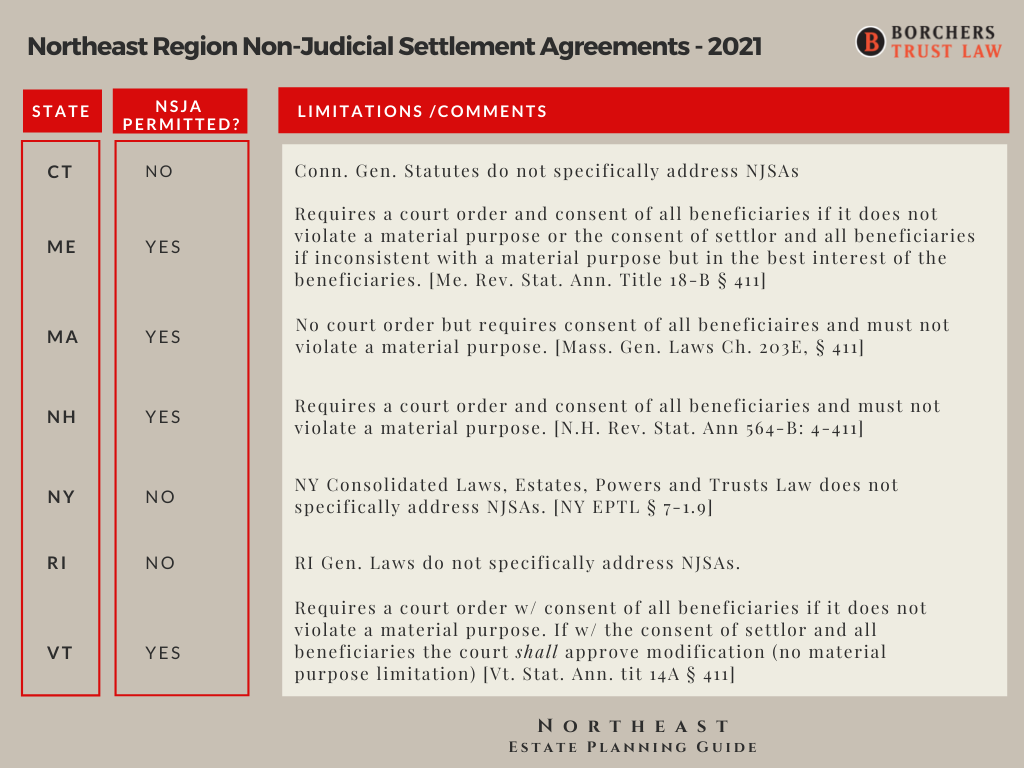Modify an Irrevocable Trust With a Non-Judicial Settlement Agreement
Modify an Irrevocable Trust With a Non-Judicial Settlement Agreement
Although irrevocable trusts can be useful tools for clients to qualify for benefits and protect assets against creditors or lower income tax liability, they may often encounter problems during a trust administration when trustees and beneficiaries realize that the trust isn’t functioning as intended and needs to be modified.
In the past, efforts to modify an irrevocable trust would require lengthy and expensive court proceedings. However, non-judicial settlement agreements (NJSA) have given parties an alternative by allowing modifications to an irrevocable agreement without court involvement. An NJSA can be useful when addressing the interpretation of provisions when the trust document is silent or ambiguous and may be used to resolve trustee or beneficiary disputes without court approval or involvement.
What the Law Says:
Many states have adopted the Uniform Trust Code. For example, under the Massachusetts Uniform Trust Code (MUTC), interested persons may enter into a binding non-judicial settlement agreement with respect to any matter involving a trust. All interested parties must consent to the modification and there are important limitations on what trust terms can be modified.
An “interested person” is defined as a person whose consent would be required to achieve a binding settlement were the settlement to be approved by the court. Depending on the type of trust and terms, this could include current beneficiaries, contingent beneficiaries, remainder beneficiaries, trustees, trust protectors, and the grantors.
If there are minor or unborn children or disabled beneficiaries who may have an interest, typically they may be represented by an individual with the substantially identical interest (such as a parent) so long as there is no conflict of interest. A NJSA will only be binding upon the interested persons that have been given notice to the agreement.
The following matters are commonly resolved by an NJSA:
- The interpretation of the terms of a trust
- The approval of a trustee’s report or accounting
- The direction to a trustee to refrain from performing a particular act or the grant to a trustee of any necessary or desirable power
- The resignation or appointment of a trustee and the determination of a trustee’s compensation
- The transfer of a trust’s principal place of administration
- The liability of a trustee for an action relating to the trust
This is a non-exclusive list and therefore additional matters may be resolved by agreement. However, non-judicial settlement agreements typically may not not violate a material purpose of the trust agreement.
Some examples of a material purpose include trusts created to benefit charities, trusts meant to treat beneficiaries equally, or a trust created to preserve a family compound or the ongoing operation of a business. The most common example of a material purpose are trusts containing spendthrift provisions.
If the grantor is still alive, it is helpful to have the grantor sign as a party to the NJSA to support the assertion that the agreement does not violate his or her material purpose. Some states may even permit the NJSA to be inconsistent with the trust’s material purpose if all the beneficiaries and grantor agree.
When to Consider an NJSA:
Depending on the terms of the irrevocable trust, NJSAs may be useful to settle disputes or to clarify terms. They can address ambiguities, correct mistakes, and change administrative provisions. Some of the reasons to modify a trust may include the following:
- Correcting a drafting error
- Changing administrative terms
- Dividing or merging trusts
- Reducing administrative costs
- Providing for further succession of trustees
- Transferring and protecting assets to a special needs trust
- Addressing changes in circumstances relating to the 5 Ds (death, divorce, disability, destructive habits, or debt)
- Applying a GST exemption
- Dividing trust assets to make use of the marital deduction
Non-judicial settlement agreements are useful tools because they allow flexibility when circumstances arise in the settlement of an estate. NJSAs encourage resolutions of disputes by nonjudicial means, giving them the same effect as if approved by the courts, saving the time and expense of a judicial proceeding.
Real-World Case Study:
An irrevocable trust was created by the grantor, Georgia, naming her daughter, Tess, as the trustee. The trust instrument gave Tess the power to name successor trustees. Georgia died and the trust became irrevocable. Unfortunately, Tess passed away shortly after her mother and the trust agreement failed to provide for what would happen when no successor trustee was named.
Tess’ children were the beneficiaries of the trust and the trust was clear that its material purpose was to provide protection for the beneficiaries by placing restrictions on the beneficiaries’ access to the trust principal. The beneficiaries however were not specifically given authority regarding successor trustee choice.
In order to avoid the cost of court involvement, the beneficiaries entered into an NJSA that named the successor trustee and also modified the trust to provide for future appointment of successor trustees if further vacancies occur. The addition of these provisions allows the trust more flexibility and ease without the need for court involvement.
